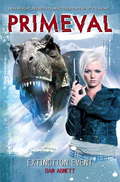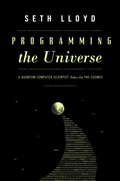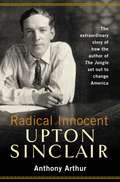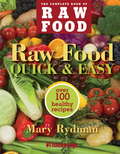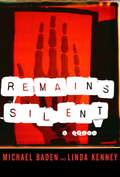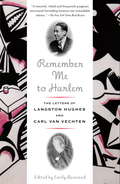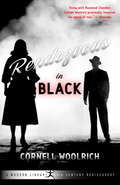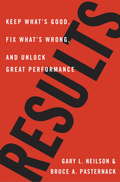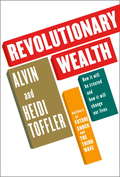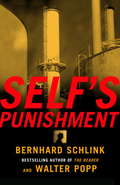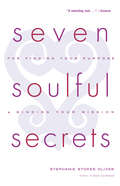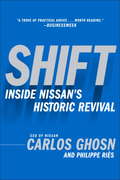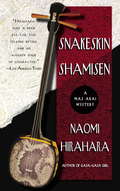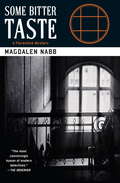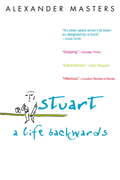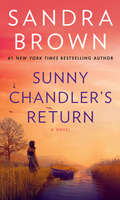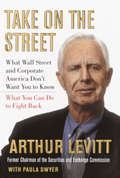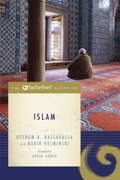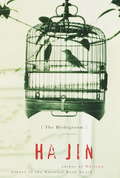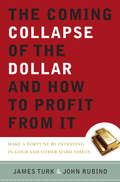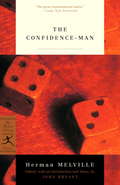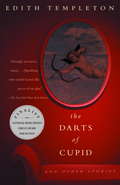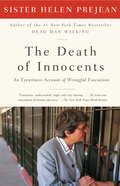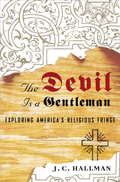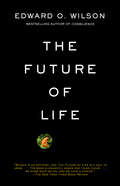- Table View
- List View
Primeval: Extinction Event
by Dan AbnettStrange anomalies are ripping holes in the fabric of time, allowing creatures from the distant past and far future to roam the modern world. Evolutionary zoologist Nick Cutter and his team must track down and capture these dangerous creatures and try to put them back where they belong.
Programming the Universe
by Seth LloydThe universe is made of bits. The way in which the universe registers and processes information determines what it is and how it behaves. It has been known for more than a century that every piece of the universe - every electron, atom, and molecule - registers bits of information. It is only in the last ten years, however, with the discovery and development of quantum computers, that scientists have gained a fundamental understanding of just how that information is registered and processed. Seth Lloyd calls this fundamental understanding of the universe in terms of information processing 'the computational universe', and the purpose of this book is to show how the programmed, computational universe works. Starting from basic concepts of physics, Programming the Universe shows how all physical systems register information. It gives an accessible account of how information is stored and processed at the level of electrons, atoms, and molecules. It shows how the information processing power of the universe can be harnessed to build quantum computers and explains how the universe itself behaves like a gigantic computer, transforming and processing information. It traces the history of information processing from the big bang to the present day, and reveals how the computational ability of the universe promotes the evolution of complex structures such as life. Programming the Universe is the story of the universe and the bits it is made of.
Radical Innocent: Upton Sinclair
by Anthony ArthurFew American writers have revealed their private as well as their public selves so fully as Upton Sinclair, and virtually none over such a long lifetime (1878—1968). Sinclair’s writing, even at its most poignant or electrifying, blurred the line between politics and art–and, indeed, his life followed a similar arc. In Radical Innocent: Upton Sinclair, Anthony Arthur weaves the strands of Sinclair’s contentious public career and his often-troubled private life into a compelling personal narrative. An unassuming teetotaler with a fiery streak, called a propagandist by some, the most conservative of revolutionaries by others, Sinclair was such a driving force of history that one could easily mistake his life story for historical fiction. He counted dozens of epochal figures as friends or confidants, including Mark Twain, Jack London, Henry Ford, Thomas Mann, H. G. Wells, Theodore and Franklin Roosevelt, Albert Einstein, Charlie Chaplin, Albert Camus, and Carl Jung. Starting with The Jungle in 1906, Sinclair’s fiction and nonfiction helped to inform and mold American opinions about socialism, labor and industry, religion and philosophy, the excesses of the media, American political isolation and pacifism, civil liberties, and mental and physical health. In his later years, Sinclair twice reinvented himself, first as the Democratic candidate for governor of California in 1934, and later, in his sixties and seventies, as a historical novelist. In 1943 he won a Pulitzer Prize for Dragon’s Teeth, one of eleven novels featuring super-spy Lanny Budd. Outside the literary realm, the ever-restless Sinclair was seemingly everywhere: forming Utopian artists’ colonies, funding and producing Sergei Eisenstein’s film documentaries, and waging consciousness-raising political campaigns. Even when he wasn’t involved in progressive causes or counterculture movements, his name often was invoked by them–an arrangement that frequently embroiled Sinclair in controversy. Sinclair’s passion and optimistic zeal inspired America, but privately he could be a frustrated, petty man who connected better with his readers than with members of his own family. His life with his first wife, Meta, his son David, and various friends and professional acquaintances was a web of conflict and strain. Personally and professionally ambitious, Sinclair engaged in financial speculation, although his wealth-generating schemes often benefited his pet causes–and he lobbied as tirelessly for professional recognition and awards as he did for government reform. As the tenor of his work would suggest, Sinclair was supremely human. In Radical Innocent: Upton Sinclair, Anthony Arthur offers an engrossing and enlightening account of Sinclair’s life and the country he helped to transform. Taking readers from the Reconstruction South to the rise of American power to the pinnacle of Hollywood culture to the Civil Rights era, this is historical biography at its entertaining and thought-provoking finest. Praise "Lively, unsparing look at the turn-of-the-century muckraker, social critic and novelist who changed the way America did business. . . . Arthur organizes his biography into chapters reflecting Sinclair's various crusading "selves"—e. g. , The Warrior, The Pilgrim of Love, etc. —and uses a deft, light touch. . . An immensely readable biography. "– Kirkus Reviews “. . excellent new biography. ”– USA Today “…a model of good biography. ” –Los Angeles Magazine “Absorbing. ” –The Wall Street Journal "intimate and intellectually astute. &quo
Raw Food Quick & Easy: Over 100 Healthy Recipes
by Mary RydmanWith the simple recipes in Raw Food Quick Easy, you can create healthy, delicious raw meals in less time than you would need to create most traditional recipes. Featuring easy to follow, step by step instructions for each recipe, each meal utilizes specific fruits and vegetables to maximize your energy and vitality. Whether you would like to eat raw food exclusively or are simply looking for a delicious, healthful way to incorporate the range of vitamins, nutrients, and antioxidants in fresh produce into your diet, Raw Food Quick Easy makes eating raw simple, tasty and fun.
Remains Silent
by Linda Kenney Michael BadenWhen a body is found beneath a construction site near the Catskill Mountains, New York City deputy chief medical examiner Jake Rosen is called to the scene, where he meets his match: Philomena "Manny" Manfreda, a beautiful crusading attorney. Together they stumble upon a decades-old mystery involving a long-shuttered mental institution, shocking medical experiments, and a troubled love affair.From the Paperback edition.
Remember Me to Harlem
by Emily BernardLangston Hughes is widely remembered as a celebrated star of the Harlem Renaissance -- a writer whose bluesy, lyrical poems and novels still have broad appeal. What's less well known about Hughes is that for much of his life he maintained a friendship with Carl Van Vechten, a flamboyant white critic, writer, and photographer whose ardent support of black artists was peerless. Despite their differences — Van Vechten was forty-four to Hughes twenty-two when they met–Hughes’ and Van Vechten’s shared interest in black culture lead to a deeply-felt, if unconventional friendship that would span some forty years. Between them they knew everyone — from Zora Neale Hurston to Richard Wright, and their letters, lovingly and expertly collected here for the first time, are filled with gossip about the antics of the great and the forgotten, as well as with talk that ranged from race relations to blues lyrics to the nightspots of Harlem, which they both loved to prowl. It’s a correspondence that, as Emily Bernard notes in her introduction, provides “an unusual record of entertainment, politics, and culture as seen through the eyes of two fascinating and irreverent men.
Rendezvous in Black
by Cornell WoolrichOn a mild midwestern night in the early 1940s, Johnny Marr leans against a drugstore wall. He's waiting for Dorothy, his fiancée, and tonight is the last night they'll be meeting here, for it's May 31st, and June 1st marks their wedding day. But she's late, and Johnny soon learns of a horrible accident--an accident involving a group of drunken men, a low-flying charter plane, and an empty liquor bottle. In one short moment Johnny loses all that matters to him and his life is shattered. He vows to take from these men exactly what they took from him. After years of planning, Johnny begins his quest for revenge, and on May 31st of each year--always on May 31st--wives, lovers, and daughters are suddenly no longer safe.
Results
by Gary L. Neilson Bruce A. PasternackEvery company has a personality. Does yours help or hinder your results? Does it make you fit for growth? Find out by taking the quiz that's helped 50,000 people better understand their organizations at OrgDNA.com and to learn more about Organizational DNA.Just as you can understand an individual's personality, so too can you understand a company's type--what makes it tick, what's good and bad about it. Results explains why some organizations bob and weave and roll with the punches to consistently deliver on commitments and produce great results, while others can't leave their corner of the ring without tripping on their own shoelaces. Gary Neilson and Bruce Pasternack help you identify which of the seven company types you work for--and how to keep what's good and fix what's wrong. You'll feel the shock of recognition ("That's me, that's my company") as you find out whether your organization is:* Passive-Aggressive ("everyone agrees, smiles, and nods, but nothing changes"): entrenched underground resistance makes getting anything done like trying to nail Jell-O to the wall* Fits-and-Starts ("let 1,000 flowers bloom"): filled with smart people pulling in different directions* Outgrown ("the good old days meet a brave new world"): reacts slowly to market developments, since it's too hard to run new ideas up the flagpole* Overmanaged ("we're from corporate and we're here to help"): more reporting than working, as managers check on their subordinates' work so they can in turn report to their bosses* Just-in-Time ("succeeding, but by the skin of our teeth"): can turn on a dime and create real breakthroughs but also tends to burn out its best and brightest* Military Precision ("flying in formation"): executes brilliant strategies but usually does not deal well with events not in the playbook* Resilient ("as good as it gets"): flexible, forward-looking, and fun; bounces back when it hits a bump in the road and never, ever rests on its laurelsFor anyone who's ever said, "Wow, that's a great idea, but it'll never happen here" or "Whew, we pulled it off again, but I'm tired of all this sprinting," Results provides robust, practical ideas for becoming and remaining a resilient business. Also available as an eBookFrom the Hardcover edition.
Revolutionary Wealth
by Alvin TofflerStarting with the publication of their seminal bestseller, Future Shock, Alvin and Heidi Toffler have given millions of readers new ways to think about personal life in today’s high-speed world with its constantly changing, seemingly random impacts on our businesses, governments, families and daily lives. Now, writing with the same rare grasp and clarity that made their earlier books classics, the Tofflers turn their attention to the revolution in wealth now sweeping the planet. And once again, they provide a penetrating, coherent way to make sense of the seemingly senseless. Revolutionary Wealth is about how tomorrow’s wealth will be created, and who will get it and how. But twenty-first-century wealth, according to the Tofflers, is not just about money, and cannot be understood in terms of industrial-age economics. Thus they write here about everything from education and child rearing to Hollywood and China, from everyday truth and misconceptions to what they call our “third job”—the unnoticed work we do without pay for some of the biggest corporations in our country. They show the hidden connections between extreme sports, chocolate chip cookies, Linux software and the “surplus complexity” in our lives as society wobbles back and forth between depressing decadence and a hopeful post-decadence. In their earlier work, the Tofflers coined the word “prosumer” for people who consume what they themselves produce. In Revolutionary Wealth they expand the concept to reveal how many of our activities—whether parenting or volunteering, blogging, painting our house, improving our diet, organizing a neighborhood council or even “mashing” music—pump “free lunch” from the “hidden” non-money economy into the money economy that economists track. Prosuming, they forecast, is about to explode and compel radical changes in the way we measure, make and manipulate wealth. Blazing with fresh ideas, Revolutionary Wealth provides readers with powerful new tools for thinking about—and preparing for—their future. From the Hardcover edition.
Self's Punishment
by Bernhard Schlink Walter PoppSixty-eight years old; a smoker of Sweet Aftons, a dedicated drinker of Aviateur cocktails, and the owner of a charismatic cat named Turbo, Gerhard Self is a somewhat unconventional private detective. During the war he was a Nazi state prosecutor, and he is still haunted by the memories of his misguided youth. His usual cases involve insurance investigations - such as the case of the ballet dancer who may or may not have deliberately broken his leg in order to claim compensation - and he shares them over games of Doppelkopf with his friends: a chessmaster, an ornithologist and a surgeon. So when Self is summoned by his long-time friend and rival Korten to investigate several incidents of computer-hacking at a chemicals company, he finds himself dealing with an unfamiliar kind of crime, and one that throws up many challenges for the computer-illiterate detective. But in his search for the hacker and his attempts to prevent a hazardous chemical leak, Self stumbles upon something far more sinister. His investigation eventually unearths dark secrets that have been hidden for decades, and forces Self to confront his own demons of guilt, responsibility and loyalty.
Seven Soulful Secrets
by Stephanie Stokes OliverFrom the author of "Daily Cornbread" comes seven soulful secrets that will motivate women to become not just better than they are, but the best they can be. Copyright © Libri GmbH. All rights reserved.
Shift
by Carlos Ghosn Philippe RiosIn Shift, Carlos Ghosn, the brilliant, audacious, and widely admired CEO of Nissan, recounts how he took the reins of the nearly bankrupt Japanese automotive company and achieved one of the most remarkable turnarounds in automotive—and corporate—history. When Carlos Ghosn (pronounced like “phone”) was named COO of Nissan in 1999, the company was running out of gas and careening toward bankruptcy. Eighteen short months later, Nissan was back in the black, and within several more years it had become the most profitable large automobile company in the world. In SHIFT, Ghosn describes how he went about accomplishing the seemingly impossible, transforming Nissan once again into a powerful global automotive manufacturer. The Brazilian-born, French-educated son of Lebanese parents, Ghosn first learned the management principles and practices that would shape his decisions at Nissan while rising through the ranks at Michelin and Renault. Upon his arrival at Nissan, Ghosn began his new position by embarking on a three-month intensive examination of every aspect of the business. By October 1999 he was ready to announce his strategy to turn the company around with the Nissan Revival Plan. In the plan, he consistently challenged the tradition-bound thinking and practices of Japanese business when they inhibited Nissan’s effectiveness. Ghosn closed plants, laid off workers, broke up long-standing supply networks, and sold off marginal assets to focus on the company’s core business. But slashing costs was just the first step in Nissan’s recovery. In fact, Ghosn introduced changes in every corner of the company, from manufacturing and engineering to marketing and sales. He updated Nissan’s car and truck lineup, took risks on dynamic new designs, and demanded improvements in quality—strategies that quickly burnished Nissan’s image in the marketplace, and re-established the company in the minds of consumers as a leader in innovation and engineering. Like the best-selling memoirs of Jack Welch, Lou Gerstner, and Larry Bossidy, SHIFT is a fascinating behind-the-scenes look at what it takes to transform and re-create a world-class company. Written by one of the world’s most successful and acclaimed CEOs, SHIFT is an invaluable guide for business readers everywhere.
Snakeskin Shamisen
by Naomi HiraharaFrom Summer of the Big Bachi to Gasa-Gasa Girl, Naomi Hirahara’s acclaimed novels have featured one of mystery fiction’s most unique heroes: Mas Arai, a curmudgeonly L. A. gardener, Hiroshima survivor, and inveterate gambler. Few things get Mas more excited than gambling, so when he hears about a $500,000 win–from a novelty slot machine!–he’s torn between admiration and derision. But the stakes are quickly raised when the winner, a friend of Mas’s pal G. I. Hasuike, is found stabbed to death just days later. The last thing Mas wants to do is stick his nose in someone else’s business, but at G. I. ’s prodding he reluctantly agrees to follow the trail of a battered snakeskin shamisen (a traditional Okinawan musical instrument) left at the scene of the crime…and suddenly finds himself caught up in a dark mystery that reaches from the islands of Okinawa to the streets of L. A. –a world of heartbreaking memories, deception, and murder. From the Trade Paperback edition.
Some Bitter Taste
by Magdalen NabbMarshal Salvatore Guarnaccia is a decent policeman who meant to follow up on Signora Sara Hirsch's complaint that an intruder had been in her apartment. But by the time he's dealt with the other cases handed to him at that moment, the signora has been murdered.
Stuart A Life Backwards: A Life Backwards (Perennial Non-fiction Promotion Ser.)
by Alexander MastersA major new launch for the paperback edition of the most original, capitvating and award-winning memoir of the year. Stuart, A Life Backwards, is the story of a remarkable friendship between a reclusive writer and illustrator ('a middle class scum ponce, if you want to be honest about it, Alexander) and a chaotic, knife-wielding beggar whom he gets to know during a campaign to release two charity workers from prison. Interwoven into this is Stuart's confession: the story of his life, told backwards. With humour, compassion (and exasperation) Masters slowly works back through post-office heists, prison riots and the exact day Stuart discovered violence, to unfold the reasons why he changed from a happy-go-lucky little boy into a polydrug-addicted-alcoholic Jekyll and Hyde personality, with a fondness for what he called 'little strips of silver' (knives to you and me). Funny, despairing, brilliantly written and full of surprises: this is the most original and moving biography of recent years.
Sunny Chandler's Return
by Sandra BrownNever. Sunny Chandler always said she'd never go back to the tiny town where she grew up. It was just three years ago that she was at the center of a notorious scandal-and the good folks of Latham Green, Louisiana, made it clear they'd never let her forget it. So Sunny packed up and headed for New Orleans, and now she wouldn't give up city life for the world. But when she's invited to her best friend's wedding, Sunny has no choice but to go home. And with her return come the whispers...the looks...the rumors she tried to escape. It doesn't take Sunny long to see that Latham Green has nothing new to offer. Except maybe Ty Beaumont. The moment Ty and Sunny first meet at a party, he can see she's no ordinary woman. With her dazzling hair, and eyes the color of gold, she's a flesh-and-blood fantasy-and Ty vows he'll have her in his bed before the week is out. Yet even when he turns on his southern charm, Sunny makes it clear she's not interested. Sure, a night with Ty would be wilder than Bourbon Street at Mardi Gras. But Sunny's not in town to become some good ol' boy's latest conquest, no matter how sexy he is. Little does she know that Ty isn't used to taking no for an answer-and he isn't about to start now. Soon what began as an innocent flirtation becomes a tantalizingly slow, skillfully deliberate, and overwhelmingly seductive pursuit that even Sunny finds hard to resist. But resist him she will. For Sunny is harboring an agonizing secret-the painful truth of why she left Latham Green the way she did. What she really needs now is a friend-and that's when she discovers there may be more to Ty Beaumont than meets the eye. Despite his roguish facade, Sunny comes to see he has a heart of gold. Still, she doesn't know if she can trust another person with her secret heartbreak-not even the one man who may be able to heal it.
Take on The Street
by Arthur LevittInTake on the Street, Arthur Levitt--Chairman of the Securities and Exchange Commission for eight years under President Clinton--provides the best kind of insider information: the kind that can help honest, small investors protect themselves from the deliberately confusing ways of Wall Street. At a time when investor confidence in Wall Street and corporate America is at an historic low, when many are seriously questioning whether or not they should continue to invest, Levitt offers the benefits of his own experience, both on Wall Street and as its chief regulator. His straight talk about the ways of stockbrokers (they are salesmen, plain and simple), corporate financial statements (the truth is often hidden), mutual fund managers (remember who they really work for), and other aspects of the business will help to arm everyone with the tools they need to protect—and enhance—their financial future.
The Beliefnet Guide to Islam
by Hesham A. Hassaballa Kabir HelminskiThis concise introduction to Islam offers a sophisticated and informative exploration of the history, beliefs, tenets, and practices of the second-largest religion in the world. There are 1. 3 billion Muslims in the world today, yet Islam remains a misunderstood faith. In this day and age, when issues related to Islam are dominating current affairs,The Beliefnet® Guide to Islamtakes readers into the heart of this global religion, describing its origins, its links to Judaism and Christianity, and its place and practices in the modern world. In clear, unbiased language, the authors outline the core beliefs that shape the daily lives of practicing Muslims: faith, prayer, charity, fasting and self-purification (during the period of Ramadan), and the Hajj (the annual pilgrimage to Mecca). They clarify the differences between the Sunni and the Shia, the two main branches of Islam, shedding light on a topic that has garnered attention during the current crises in Iraq and other parts of the Muslim world. Hassaballa and Helminski also look at the many misinterpretations of basic terms and beliefs that have had a serious impact on the relationship between Muslims and those who practice other religions, explaining such essentials as the meaning ofjihad,Islamic teachings on the role of women in society, and much more. From the premier source of information on religion and spirituality, the Beliefnet® Guides introduce you to the major traditions, leaders, and issues of faith in the world today.
The Bridegroom
by Ha JinThese twelve short stories vividly bring to life the daily dramas of Chinese men and women who are starting to feel the influence of the West while still immersed in a society that attempts to control their every move and thought. As his characters wrestle with the petty injustices and deeper heartbreaks of their constricted lives, Ha Jin celebrates their irrepressible humanity with the understated humour and disarmingly simple narrative voice that have won him widespread acclaim.
The Coming Collapse of the Dollar and How to Profit From It
by James Turk John RubinoPeriodically, the global economy shifts gears in a fundamental way, turning conventional wisdom on its head and producing new categories of winners and losers among investors.
The Confidence-Man
by Herman MelvillePoorly received when first published in 1857, The Confidence Man is now considered Herman Melville's most nearly perfect work, and one that occupies a central place in the American literary tradition of masquerade and trickery. Set on April Fool's Day aboard a Mississippi steamer, this powerful and engaging novel, through the conversations of the confidence man (who may be looked on as the Devil or God), explores America and American values. Part satire, part hoax, The Confidence Man is also a dark look at the nothingness lurking beneath our beliefs and assumptionsa look at a universe in which neither God nor the Devil exists, and where Christianity is only a comforting fiction little better than an April Fool's prank.
The Darts of Cupid
by Edith TempletonWhen Edith Templeton’s stories began appearing inThe New Yorkerin the late 1950s, she quickly became a favorite of the magazine’s discerning readers. Her finely honed writing, honestly drawn heroines, and distinctive themes secured her reputation. The Dart’s of Cupidcollects seven of Templeton’s stories for the first time and reintroduces one of the truly great writers of the twentieth century. In settings ranging from a decrepit Bohemian castle between the wars to London during World War II to the Italian Riviera in the 1990s, the heroines of these stories often find themselves confronting unfathomable passsions and perplexing actions by others, but they seldom feel regret.
The Death of Innocents
by Helen PrejeanFrom the author of the national bestseller Dead Man Walking comes a brave and fiercely argued new book that tests the moral edge of the debate on capital punishment: What if we're executing innocent men? Two cases in point are Dobie Gillis Williams, an indigent black man with an IQ of 65, and Joseph Roger O'Dell. Both were convicted of murder on flimsy evidence (O'Dell's principal accuser was a jailhouse informant who later recanted his testimony). Both were executed in spite of numerous appeals. Sister Helen Prejean watched both of them die.As she recounts these men's cases and takes us through their terrible last moments, Prejean brilliantly dismantles the legal and religious arguments that have been used to justify the death penalty. Riveting, moving, and ultimately damning, The Death of Innocents is a book we dare not ignore.From the Trade Paperback edition.ng on the forensic evidence, which he claimed would exonerate him, but the courts refused. After his execution on July 23, 1997, the state destroyed the evidence. As a result, its conviction of O'Dell could never be scrutinized. "The reader of this book will be the first 'jury' with access to all the evidence the trial juries never saw," says Prejean, who accompanied both men to their executions. By using the withheld evidence to reconstruct the crimes for which these two men were convicted, Prejean shows how race, prosecutorial ambition, poverty, election cycles, and publicity play far too great a role in determining who dies and who lives.Prejean traces the historical underpinnings of executions in this country, demonstrating that it is no accident that over 80 percent of executions in the past twenty-five years have been carried out in the former slave states. She also raises profound constitutional questions about an appeals system that decides most death cases on procedural grounds without ever examining their merits.To date, 113 wrongfully convicted persons have been freed from death row. If constitutional protections-due process, assistance of counsel, and equal justice under law-are truly being respected, how is it possible that these people were convicted in the first place? And how can we accept a system so rife with error?Sister Helen Prejean takes us with her on her spiritual journey as she accompanies two possibly innocent human beings to their deaths at the hands of the state. Prejean implores us to reflect on what is perhaps the core moral issue of the death penalty debate: Honorable people disagree about the justice of executing the guilty, but can anyone argue about the injustice of executing the innocent?From the Hardcover edition.
The Devil Is a Gentleman
by J. C. HallmanA hundred years ago, the writer and philosopher William James wrote The Varieties of Religious Experience, a seminal work that has inspired generations of scholars and eccentrics alike. James’s book argues that the religious spirit in man is best understood through the study of its most extreme forms. Varieties was a watershed effort: a bestselling portrait of history’s pluralism and a defense of the spiritual quest, in all its guises, against the era’s increasingly secular sentiments. Today, with all the old tensions between skeptics and believers still in place, J. C. Hallman pays homage to James’s exploration of offbeat religious movements. But where James relied on the testimony and biographies of prophets and mystics, Hallman travels directly to some of America’s newest and most unusual religions, trekking from Druid circles in the mossy hills of northern California to the gleaming mother church of Scientology, from lurid satanic cellars in undisclosed locations to a professional-wrestling ministry in the fundamentalist heart of Texas. Along the way, he participates in a variety of rites and reports on a broad spectrum of beliefs. Eventually Hallman adopts James as his patron saint, spiritual adviser, and intellectual companion on the journey that will culminate in the creation of this book, a compelling combination of adventure and biography, spotted with hair-raising predicaments and rife with poignant portraits of unforgettable characters, including William James himself. The Devil Is a Gentlemanmaps the spiritual contours of modern American pluralism and examines the life and legacy of one of its most profound architects. From the Hardcover edition.
The Future of Life
by Edward O. WilsonOur world is far richer than previously conceived, yet so ravaged by human activity that half its species could be gone by the end of the present century. These two contrasting themes - unexpected magnificence and underestimated peril - have originated during the past two decades of research. In this timely and important new book, one of our greatest living scientists describes exactly what treasures of the natural world we are about to lose forever and what we can do right now to save them. Destruction of natural habitats, the rampant spread of invasive species, pollution, uncontrolled population growth and over harvesting are the main threats to our natural world. Wilson explains how each of these elements works to undo the web of life that supports us, and why it is in our best interests to stop it. The Future of Life is a magisterial accomplishment - both a moving description of the world's astonishing animals and plants and a guidebook for the protection of all its species, including our own.
